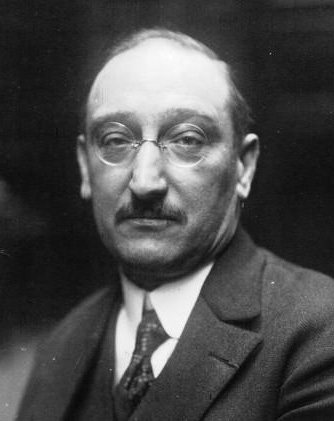| Profile | Major Works | Resources |
Étienne Antonelli, 1879-1971

French economist, principal adherent and popularizer of the Lausanne School in France (not to be confused with the Italian G.B. Antonelli.)
Born in Valencia, Spain, to a family of French wine merchants, Etienne Antonelli studied law and published works of an institutional character of the French Historical school. In 1906, he began teaching at the law faculty of Montpellier, where Charles Gide and Charles Rist held sway. It was around this time he fell into the "social democracy" movement of Aristide Briand and became an editor of their principal organ, Democratie Sociale, which centered on an "integralist" ideology based on decentralized private associations and syndicates. They pushed for social reform, while avoiding the extreme confrontational stance of revolutionary socialism and the "bankrupt" ideology of classical liberalism. Antonelli, who was responsible for authoring their manifesto (1910), drew much on the ideas of Proudhon.
It was probably Antonelli's political interests that first drew him to the work of Léon Walras. But he was a swift convert and took it upon himself to popularize the work of the Lausanne School in France. Antonelli moved to Paris in 1910, taking up an appointment at the law faculty there. It was here he taught some of the first courses in mathematical economics and general equilibrium theory in France, which could culminate in his 1914 Principes.
Antonelli fought in WWI until he was wounded in 1915. He subsequently served
briefly as military attache in Russia during the heady days of the revolution
(1917-18). In his widely-read account of the event (1919), Antonelli emphasized
that the revolution was not an spontaneous outbreak of anarchic revolt, but a
rather well-organized and fluid transition from one extremely centralized,
repressive system to another. He takes the opportunity to, once again, extol the
superior virtues of Proudhonian
decentralization. This book would make him a bit of an international celebrity.
In 1919, Antonelli took up an appointment as professor of the history of
economic thought at the Lyons faculty of law. At this time, Antonelli also
returned to journalism and political activism, contributing steadily to the Lyon Republicain and the CGT's
Le Peuple.
In 1924, he was elected Socialist MP for the Haute-Savoie and
participated in the drafting of social security legislation in the late 1920s.
Antonelli retired from political life in 1934, spending his remaining years teaching at
Montpellier.
It was really at Lyons that Antonelli began to push his interpretative spin of the Lausanne School. Unlike other economists of the age, Antonelli moved beyond the equilibrium theory and insisted on regarding the entire works of Léon Walras as a comprehensive whole, with the Elements as only one of three pillars in a more general "evolutionary" theory of the economy and society. Antonelli was critical in identifying the role and importance of Auguste Walras to his son's work. By way of contrast, he took several polemical shots at W.S. Jevons. Antonelli's 1927 Traité was intended to be the first volume of his own restatement of the tripartite Walrasian vision, although he didn't get around to the remainder until nearly two decades later, in his three-volume 1944 Manuel.
Curiously, Antonelli gave comparatively little weight to the work of Pareto, although this may be more because of his inability to follow - or lack of interest in - the increasing mathematization of the Italians. Antonelli's 1944 Manuel shows how far Antonelli had deviated from - or, by some estimates, failed to keep up with - the Paretian frontier.
Nonetheless, Antonelli can be regarded as the father of a distinct tradition, the so-called "modern Lausanne School" (exemplified by François Perroux), which would carry on his mix of economic, sociological, institutional and evolutionary thinking.
|
Major Works of Étienne Antonelli
|
|
Resources on Etienne Antonelli
|
All rights reserved, Gonçalo L. Fonseca
